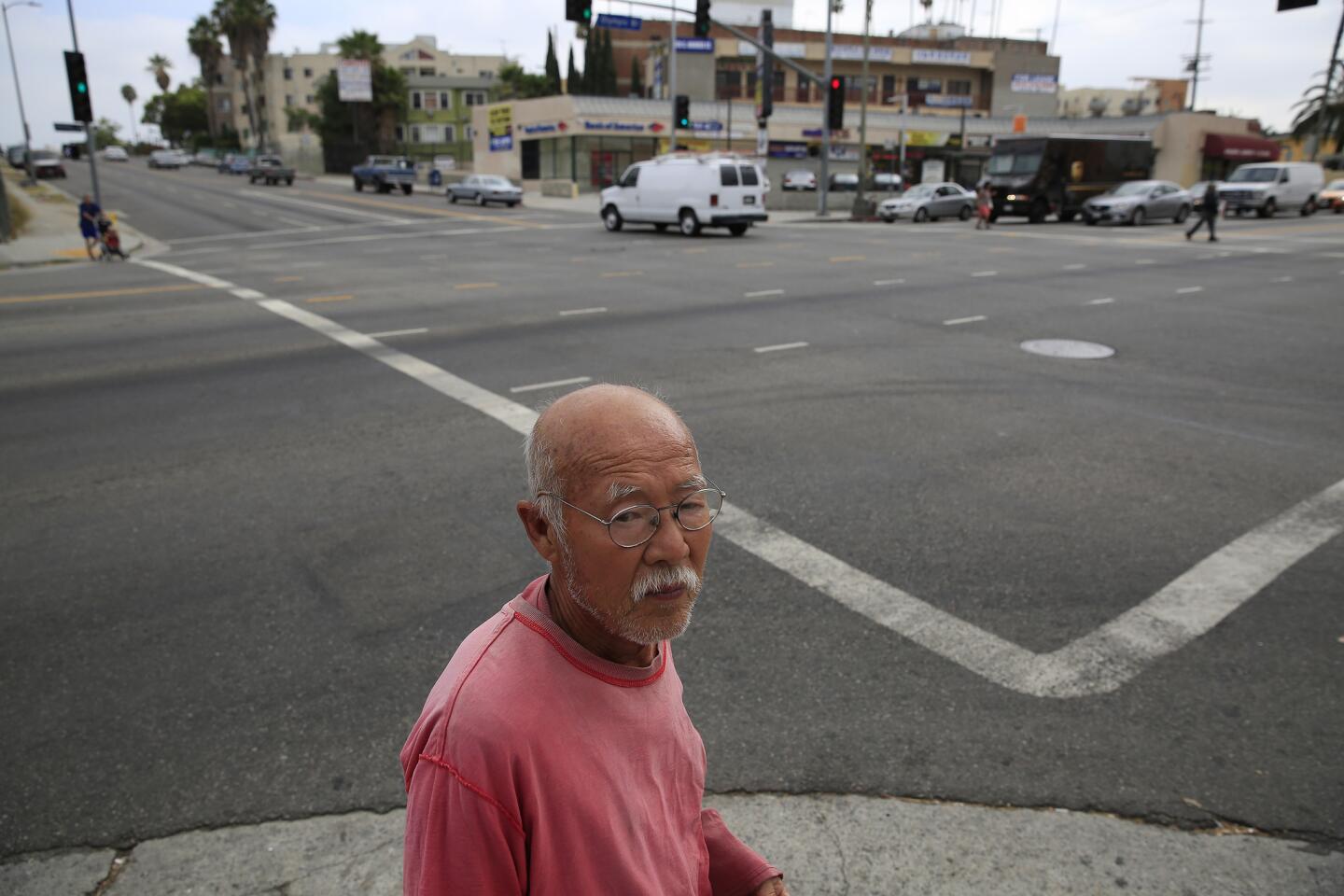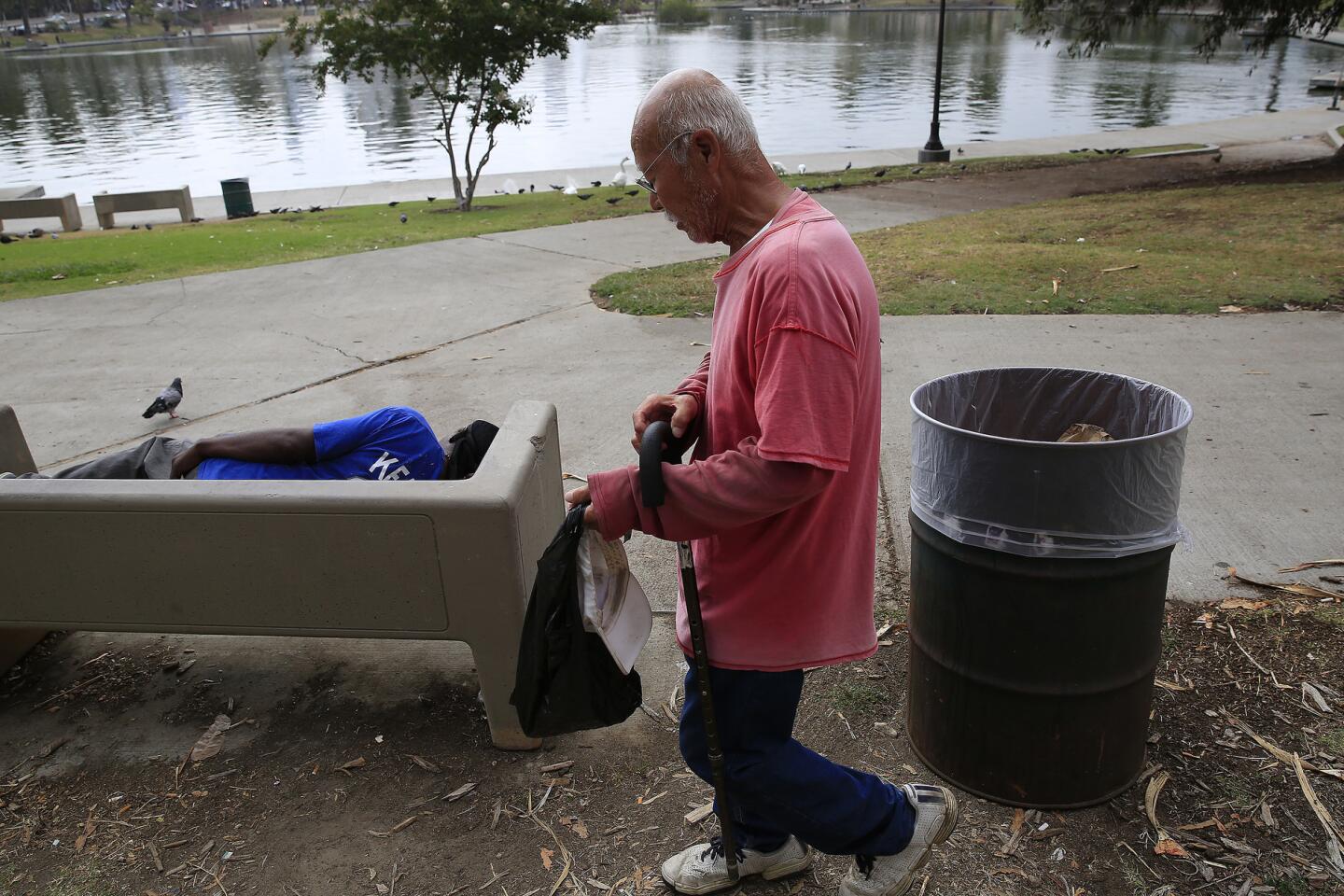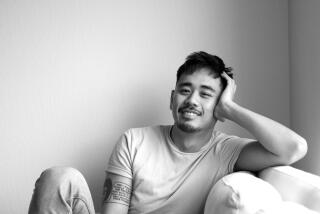Great Read: For late-starting backpacker, at 76, it’s the wander years
- Share via
It started with a quote he had heard on television about regret: that at the end of life, you are haunted not by the things you did, but by the things you didn’t do.
A few months later, Hyo So booked a hostel bed in Cairo and took off solo from his Pico-Union apartment on his first-ever backpacking trip.
Since then, he’s made his way through some 40 countries — crossing the Gobi Desert, chatting with Maasai tribesmen in Kenya, charming fellow backpackers in Kingston by singing “Jamaica Farewell.” He’s been mistaken for a beggar in Central America while holding an empty coffee cup, kept awake in threadbare dorm rooms with more than a dozen other beds, and inflicted with more than his share of traveler’s diarrhea.
“Life is experiences — and not just the good, positive ones,” he says. “This is living.”
So knows a thing or two about living — he’s 76 years old.
::
It’s long been a rite of passage to set off into the world and travel on a shoestring — have adventures, meet strangers, experience a close call or two and find yourself before you settle into your adult life.
For So, the wanderlust was always there. He says he ran away at 14 from his childhood home in Gwangyang, South Korea, stowed away on a boat and drifted from place to place working odd jobs for four months before returning home.
“I craved the outside world,” he recalled.
But after So immigrated to the U.S. in the 1970s with his wife and three children, international travel became an unthinkable luxury, backpacking a frivolity reserved for the privileged. He landed in Los Angeles with the surge of immigrants who sowed the seeds of today’s Koreatown, carving out an existence however he could. He mopped restaurant floors, emptied ashtrays in office buildings, dabbled in real estate and ran a drive-through dairy.
It wasn’t until the early 1990s that he found a steady job as a victim advocate for the Los Angeles County district attorney’s office. (There, he says, he briefly supervised V. Stiviano of Donald Sterling fame.) In the meantime, he traveled to national parks and hiked California peaks, summiting Mt. Whitney three times, the last time when he was 60. On that final climb, he started feeling the limits of his aging body. “Your knees stop listening to you,” as he puts it.
His fellow immigrants were beginning to retire after decades of hard work. Many took up golf, gathered for games of go or booked tropical cruises.
With the quote about regret echoing in his ear, So dusted off a distant schoolboy memory about the wonders of the ancient world. The Great Pyramid of Giza was the only one he could recall.
He booked a flight to Egypt, planning to spend a month traveling the country.
::
By now, So has it down pat. A frayed white baseball cap to keep out the sun, a fishing vest for its myriad pockets, well-worn sneakers in which he’s walked miles on end. Four shirts and three pairs of pants, unassuming enough to discourage robbers but not too ratty to deter conversations with other travelers or locals. Malaria medication, spare glasses and small, dark-colored pill bottles in which he stashes rum to get through airport security.
His first years of backpacking, in his early 60s, were more trial and error. On his first morning in Cairo 15 years ago, So set out for the Egyptian Museum. On his way, a man told him it was too late for him to get in; individuals, he said, could enter only before 9 a.m. The stranger offered to show him around elsewhere. Eventually, So realized the man was in cahoots with the vendors he was taking him to.
But it wasn’t until the next morning, as he was hurrying out the door to get to the museum before 9, that he learned from the hostel owner that it was a ruse. He also told So the hostel was relatively empty because foreign tourists recently had been kidnapped and killed in the desert.
Feeling vulnerable and concerned about his safety, So flew back to Los Angeles after two nights. His wife was surprised to see him so soon, but she didn’t ask questions.
Yet the experience left So feeling invigorated, even more hungry for the world. So he planned a trip to Turkey, inspired by an old Korean song about Istanbul. This time, he backpacked a full month, making his way to Greece. On his next trip, in India, he got seriously ill halfway through but forged ahead, making his way to Nepal. Embarking on each trip and making it happen on his modest budget felt like a challenge, a dare.
Young backpackers — few he met were over 30 — marveled at the bespectacled, elderly gentleman with the shock of white beard that he lets grow during his travels. Ladies decades his junior were charmed when he’d start strumming a guitar — there’s usually one at every hostel, he learned. When So complained about a paint smell at a London hostel and asked for a room change, an employee reminded him it was a youth hostel and told him to go back to bed.
Colleagues were amazed and his three children constantly worried, trying to talk him out of the next journey.
The only one who was unfazed was his wife, who knows from their half-century together — they met at a college registrar’s office — that he’s not one to be talked out of something he wants to do.
Once, she persuaded him to go on a group tour of Western Europe. He hated every minute of it, saying it felt like being back in elementary school.
“If he comes, he comes, when he goes, he goes,” she said. “I don’t worry one bit.”
::
Where today’s backpackers snap endless photos, blog about their travels and announce their every move on social media, So is very much analog.
He doesn’t take photographs, instead committing to memory scenes like the relief of an angel at a Havana mausoleum that had him pondering his own mortality. His only photos are ones other travelers have taken and emailed to him. What he sees, feels, eats and learns on his travels he scribbles on scraps of paper, sometimes on the back of guitar sheet music.
Jotted on those scraps are local words, the day’s weather, exchange rates, bus schedules. There are fleeting thoughts about human control of nature evoked by bonsai in Southeast Asia, insights on marriage derived from Maasai marital rites and their offerings of honey and sugar cane, reflections on religion upon hearing a 5 a.m. Muslim call to prayer in Tanzania.
For all the great monuments, vast landscapes and beautiful artifacts he’s seen, what So remembers are the people he’s encountered.
The elderly woman sitting next to him on a crowded Nairobi bus who took his grocery bag, carefully knotted it and put it back on his knees, motioning him to hold on to it. The grocery clerk who refused to let him buy a second bottle of liquor, concerned that he was buzzed. The merchant at a Vietnamese food stall who, without his asking, gave him a generous heap of rice to eat with his pineapple.
In those wordless exchanges, So felt jeong — a word Koreans use to describe empathy, compassion and kinship.
“You can’t feel that if you just stay here,” he said.
He has periodically submitted accounts of his trips to a Koreatown newspaper, the Korea Daily, offering travel advice, relaying insights from his adventures and encouraging other Korean seniors to give it a try. In one column, he provided tidbits on two important factors in backpacking in one’s sunset years: finding public restrooms and a place to nap.
“I frequent churches, cathedrals, mosques or temples,” he wrote. “I nod off while pretending to pray. I meet Buddha and encounter Jesus in my dreams. I circle the heavens on a horse and converse with Mohammed.”
::
Back home, So takes daily walks to MacArthur Park.
He knows each bird’s nest on his route, each blooming tree, each of the dogs by name. He collects cans and greets the homeless, traversing the streets of Pico-Union and strolling around the park with a walking stick and an ambling gait.
He next wants to visit Scandinavia, and what he still refers to as the Soviet Union. He dreams of someday backpacking through North Korea.
But this is the home he returns to after each trip. In Vietnam, he met a Korean gentleman who told him that no matter how long he lived there, he always felt like a foreigner.
“In Los Angeles, I don’t feel like an outsider, because everybody’s an immigrant,” So said. “This is my hometown now.”
More to Read
Sign up for Essential California
The most important California stories and recommendations in your inbox every morning.
You may occasionally receive promotional content from the Los Angeles Times.


















